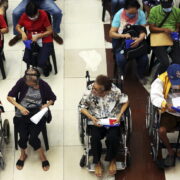Fat chance

“Too Much” is too cringe. There, I’ve said it. The main character, Jessica, played by Megan Stalter, is a plus-sized manic pixie girl who is very cute, but also very needy, very rash, very self-absorbed, and very, very dramatic. The series is loosely based on co-creator, writer and director Lena Dunham’s own romance with her now-husband, musician Luis Felber, with a sometimes sweet, sometimes cloying, sometimes hilarious and often chaotic, romcom treatment.
As we saw in “Girls,” Dunham has no qualms about unashamedly parading her own plus-sized body on TV (she does so again in the few scenes she has in “Too Much”). Jessica, clearly Dunham’s alter-ego in the series, is, for all her heft, conventionally pretty.
What is refreshing is that her weight notwithstanding, Jessica appears confident about her desirability. Indeed, visiting a pub on her first night in London, she meets Felix, played by a very dishy Will Sharpe, a hot but aimless (and damaged) musician, and after a few mishaps which involve her setting herself on fire, they hook up.
By the time she gets to her new workplace, the fresh transplant from Brooklyn confesses to her new co-workers that she’s sort of dating someone already.
Felix is not the only one who falls for Jessica. There’s her neighbor Gaz, who claims to have loved her the moment he first set eyes on her, as well as the hotshot film director played by Andrew Scott, who goes down on her while scouting locations for a commercial. And then there’s her ex-boyfriend of seven years in New York, Zev, who cheated on her with Wendy, played by Emily Ratajkowski.
In a world that worships at the altar of thinness, the fat girl getting the hot guy is, you’d have to admit, fairly unusual, especially onscreen. Not that it hasn’t been depicted in movies or television: think “My Big Fat Greek Wedding,” or “Bachelorette.” In these films, the fat girl is lovable and charming, but she doesn’t bare her body or flaunt her sexuality the way Jessica does in “Too Much.” Or Dunham in “Girls,” for that matter.
Jessica, for instance, is shown in various states of undress, big girl underwear and all; when fully clothed, she is in tight t-shirts that stretch across her voluminous chest and belly, too-short skirts that threaten to ride up her thighs. Her fashion is rather eccentric, to say the least. It is quite wonderful, really, that she appears so unself-conscious about her chubbiness.
And why shouldn’t chubby women like her have active and fulfilling sex lives? She has every right to be loved and adored, and she has no problems asserting herself. Her weight is, frankly, not much of an issue. Her messiness, emotionally speaking, is another story.
In fact, in a city like London, Jessica nowadays would seem more the rule than the exception. When I spent a year in the UK studying for my master’s, I noted how many large women there seemed to be at my university, and how confident they were, both in manner and dress. Like Jessica, they wore tops that clung to their curves and skirts that were often scandalously short.
As brash as it might have seemed to more conservative and fat-phobic people, their body—and sexual—positivity radiated equally positive energy.
And yet, curiously, in “Too Much,” there is a dearth of female characters of the same build as Jessica. It’s as if she is the only overweight woman in all of London. The other women in the cast, from her officemates to her neighbors, from the guests at a country wedding she and Felix attend to all of Felix’s ex-girlfriends—none of them are big the way Jessica is.
Actually, in stark contrast to Jessica, his exes are uniformly gorgeous and model-thin, and apparently still carrying a torch for him. But it is Jessica—fat, messy, cringey, self-sabotaging, so entitled American white woman Jessica—who wins him in the end, and they marry amidst a sea of red flags, his and hers.
For authenticity’s sake, Dunham should have thrown in some not exactly hunky, not exactly fit men. They’re all over the UK, too.

















